Although Americans remain split on numerous issues in contemporary politics, a new study finds widespread support among voters for states to automatically seal the records of nonviolent criminal offenders, allowing people who have served their time and paid their debts to re-enter society and pursue work, education, and family life. Voters across party lines also support the legalization of marijuana. Additionally, regardless of their position on the legalization issue, voters back efforts to seal the records of people convicted of marijuana possession after they have completed their sentence.
The results presented here are based on a 1,000-sample national online survey of registered voters conducted from April 25 to May 1, 2018 by the Center for American Progress and GBA Strategies. The same survey was administered independently to 500 registered voters in both South Carolina and Michigan—two states currently considering clean slate legislation during the same period. The findings presented here are for the national survey only. All three surveys are on file with the authors.
7 in 10 voters support efforts to automatically seal the records of nonviolent offenders
The survey presented respondents with a brief synopsis of proposed clean slate legislation; brief arguments for and against the idea; and then asked whether they would support or oppose this proposal. As seen in Figure 1, by a 70 percent to 21 percent margin, voters overall say they would support the following proposal rather than oppose it.
As you may know, several states are currently considering proposals to automatically seal the records of individuals convicted of non-violent felonies or misdemeanors, if the individual has completed his or her sentence and has not committed another criminal offense. Sealing their record does not clear an individual’s criminal record, but it means these individuals would not be required to disclose their criminal record when applying for a job, housing, or further education.
Supporters say such laws allow these individuals to move on with their lives, provide for their families, and become productive members of society.
Opponents say these laws undermine the punishment attached to those crimes and make communities less safe as a result.
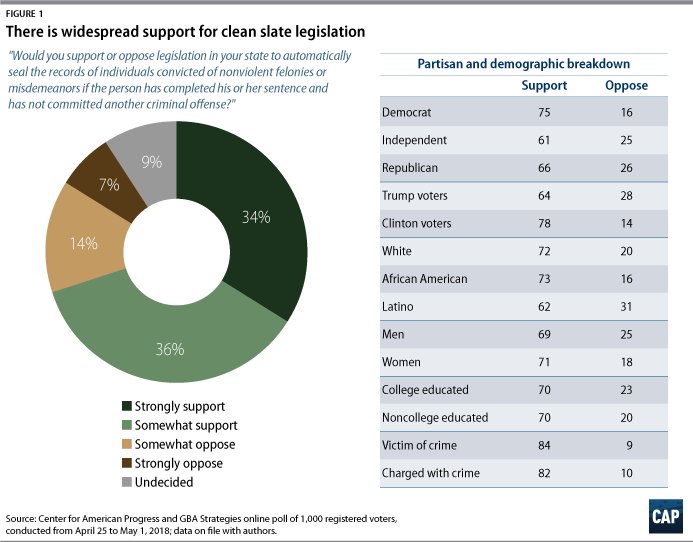
Examining partisan and demographic trends, support is consistent across nearly all groups in the study. Seventy-two percent of white voters; 73 percent of African American voters; and 62 percent of Latino voters back the clean slate proposal. Support is also bipartisan, with 61 percent of self-identified independents; 66 percent of Republicans; and 75 percent of Democrats backing the idea. Additionally, 64 percent of President Donald Trump’s voters and 78 percent of Hillary Clinton’s voters support this measure. Both men and women, as well as college-educated and noncollege-educated voters, support the clean slate idea in roughly similar proportions.
Notably, the study also finds that both victims of past crimes and those who have been charged with past crimes support the idea of automatically sealing records for nonviolent offense at 84 percent and 82 percent, respectively.
Why do people support this idea? Fifty-one percent of those backing the clean slate proposal say that the best reason to support the idea is that it “would help people with criminal records move on with their lives, provide for their families, and become productive members of society.” This reason for support far outstrips other arguments regarding safety and values.
Nearly 7 in 10 American voters support the legalization of marijuana, including 4 in 10 voters who strongly support legalization
The survey asked respondents, “Do you support or oppose the legalization of marijuana?” As seen in Figure 2, by a 68 percent to 32 percent margin, voters overall back legalization, including 40 percent who strongly support this proposal. Support for marijuana legalization includes majorities of all partisan, gender, and racial groups: 77 percent of Democrats; 62 percent of independents; 57 percent of Republicans; 66 percent of men; 69 percent of women; 69 percent of whites; 72 percent of African Americans; and 64 percent of Latinos support legalization.
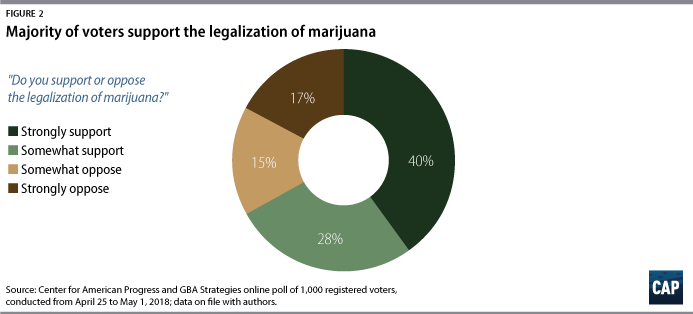
In a follow-up to the clean slate question, the study asked voters, “Would you support or oppose legislation in your state to automatically seal the records of individuals convicted of crimes related to the possession of marijuana if the person has completed his or her sentence and has not committed another criminal offense?” As seen in Figure 3, by a 73 percent to 19 percent margin, voters overall say they would support this proposal, including 42 percent who would strongly support this measure.
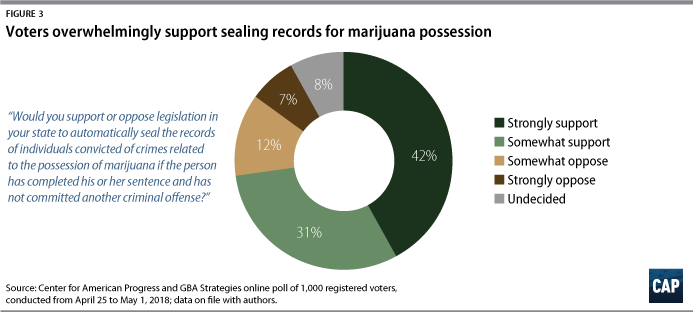
Interestingly, majorities of both supporters and opponents of marijuana legalization support the clean slate proposal to automatically seal the records of those convicted of marijuana possession: 77 percent of legalization supporters back the sealing of records as do 54 percent of legalization opponents.
Although voters are sharply divided on issues related to rehabilitation and punishment in the criminal justice system, they are unified in their support for clean slate legislation
The survey presented a series of four statement pairs assessing voters’ basic beliefs about crime, punishment, and the legal system and asked them which statement comes closer to their own view. Voters are essentially divided on these core attitudinal tests across all four items.
For example, 43 percent of voters say “[t]he main goal of our criminal justice system should be rehabilitating people to become productive, law-abiding citizens” comes close to their own view. However, 39 percent believe that “[t]he main goal of our criminal justice
system should be identifying those who
break the law and ensuring they face an appropriate punishment.” Likewise, 44 percent of voters feel that “[p]unishing those convicted of crimes beyond the end of their sentence by blocking them from education or employment opportunities makes it harder for them to re-enter society and makes it more likely they will commit a crime again” comes close to representing their own belief. This is compared to 40 percent who are more in favor of the idea that “[c]rime victims must live with the
consequences of those crimes throughout
their lives, so those who commit crimes
in our society should suffer the
consequences of those crimes throughout
their lives.”
Yet, examining Table 1, support for the clean slate proposal to automatically seal the records of nonviolent offenders cuts across voters with divergent beliefs regarding crime and punishment overall. For example, 73 percent of those who believe rehabilitation should be the main focus of the criminal justice system support clean slate legislation, as do 71 percent of those who feel appropriate punishment should be the primary focus. The pattern is repeated for the other statement pairs as well, suggesting that the clean slate ideas are viewed as essentially fair and just regardless of one’s prior perspective on how the criminal justice system should work.
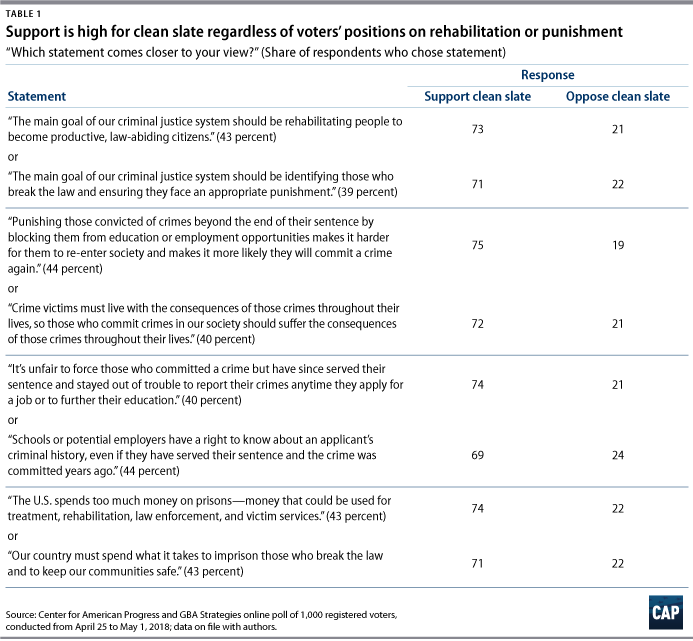
Opponents of the clean slate proposal are more likely to support the measure when presented with important factual information about what it does and the money it saves
Near the end of the survey, opponents of the clean slate proposal were asked:
While you currently oppose this proposal, would any of the following facts, if true, make you more likely to support legislation to automatically seal the records of individuals convicted of non-violent felonies or misdemeanors if the person has completed his or her sentence and has not committed another criminal offense?
Thirty percent of these opponents said they would be more likely to support the measure upon learning: “Sealing a record is not the same as clearing or expunging a
record, and an individual whose record is sealed isn’t ‘getting away’ with anything: if they are ever arrested again, law enforcement and the courts have access to their full record.” Another 29 percent say they would be more likely to support it knowing that: “Automatically sealing records of those without another conviction after 10 years will significantly reduce the workload of overburdened courts and save taxpayers money” by limiting the lengthy and onerous process of appealing for records to be sealed and diminishing the likelihood that previous offenders will commit further crimes after being offered the chance to re-establish themselves through productive work and family life.
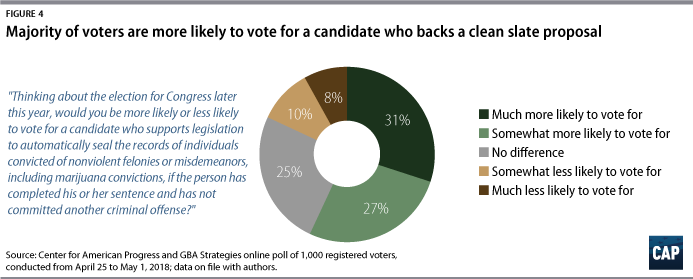
Conclusion
The results of this study are clear: Voters understand that clean slate legislation to automatically seal the records of nonviolent offenders offers a fair and humane path for people to re-enter society and an effective means to help reduce the burden on our court system.
Voters across partisan and demographic lines strongly support these measures, and political leaders who push for these measures should feel confident that voters will reward them for their efforts. In fact, as seen in Figure 4, 58 percent of voters overall say that they would be more likely to support a candidate who backs the clean slate proposal compared to only 18 percent who would be less likely to support such a candidate.
American voters are ready to move forward with this important legislation, and politicians should take their lead and bring clean slate to fruition to help nonviolent offenders move on with their lives and successfully reintegrate into American life.
John Halpin is a senior fellow and co-director of the Progressive Studies Program at the Center for American Progress. Karl Agne is a founding principal at GBA Strategies.